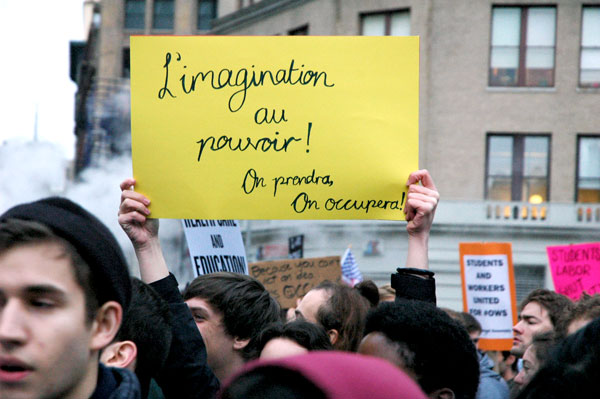There has been a certain melancholic tone adopted recently about Occupy that also contains within it a hint of relief. It suggests that “politics” can now resume, that perhaps we need to be involved with the U. S. election, and that Occupy was just a moment, which could never be carried forward. I feel the force of this but resist it. There is nothing of the politics that interests me in “politics.”
What’s happening in the present awakening is a remapping of the old modernist haunt, the city. The cityscape of New York disappeared behind the facade of the “global city,” a phantasmagoria of the coup of finance capital. This imaginary pushes the long histories of settlement, colonization and internationalization into the shades of the unspeakable. Occupy’s city is returning from the dark corners, where resistance to those processes always lived, to allow for a circulation that is not that of capital.
When Occupy emerged and consolidated itself as a space, the means by which it was incorporated back into the spectacle was as a particular instance of space: Zuccotti Park. In this imagining, Occupy is active only when there are bodies in Zuccotti. There’s some energy to this idea because having the encampment was astonishing. What’s happening now is equally intriguing–a branching out of the first space to other spaces and a re-networking of the resistant cityscape.
As Nato Thompson put it this week:
In essence, the freedom to assemble is now the freedom to occupy the public imagination.
Likewise, David Graeber has been emphasizing the recapturing of imagination as a central process of Occupy. This process does not seem to me to be a liberation of the spaces occupied by capital, so much as the creation of a new space for the imagination to map, explore, desire and create.
In Alain Badiou’s essay on the Commune, this space is what happens when you break with the
parliamentary destiny of popular and worker’s political movements.
He takes this a step further to claim that “the ‘Left'” is that
set of parliamentary political personnel that proclaim that they are the only ones equipped to bear the general consequences of a singular political movement.
That “Left” is certainly articulating this claim in relation to Occupy right now. A “break with the Left”–which would in the U. S. also be the very possibility of a politics–would then open certain spaces to the imagination and not simply occupy one space in downtown.
The Commune was famously described as follows:
One enters, one leaves, one circulates, one gathers….Approach the groups, listen. A whole people entertain profound matters. For the first time workers can be heard exchanging their appreciations on things that hitherto only philosophers had tackled. There is no trace of supervisors; no police agents obstruct the street.
It sounds familiar and not, doesn’t it? The discussions are so Occupy. The entering, leaving and circulating as well, as long as someone stays behind; as for the absence of police, that’s our future imaginary. The barricade theatre at Union Square, the +Brigades, the mobile Occupy Town Square, the circle discussions outside the U. N. yesterday–all of these things occupy this imaginary. The shadow city is tangible now. You feel strange for noticing it and get told that you are extreme for doing so. But it’s there.


Pingback: Welcome to the Twilight Zone | Occupy 2012